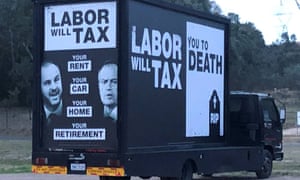Australia Institute poll shows wide-ranging support for crackdown on ‘inaccurate’ claims
The vast majority of Australians (84%) support new laws to ban
political parties and candidates from making “inaccurate and misleading”
claims, according to a new poll for the Australia Institute.
On Sunday the progressive thinktank released a discussion paper canvassing options for truth in political advertising laws, following reports of widespread misinformation in the 2019 election campaign and calls from MPs including independent Zali Steggall and Liberal Jason Falinski for new minimum standards.
The paper noted that truth in advertising laws operate in South Australia, where the Electoral Commission can request material be withdrawn and retracted and financial penalties apply, and New Zealand, where the media industry is self-regulated by an advertising standards body.
It argues that industry bodies including Free TV Australia and the Advertising Standards Bureau could regulate truth in advertising, preventing the Australian Electoral Commission from being drawn into the contentious political process of adjudication.
“Several models for increasing the truthfulness of election campaigns
are available to policymakers,” it said. “They are popular and proven
to work in other jurisdictions.”On Sunday the progressive thinktank released a discussion paper canvassing options for truth in political advertising laws, following reports of widespread misinformation in the 2019 election campaign and calls from MPs including independent Zali Steggall and Liberal Jason Falinski for new minimum standards.
The paper noted that truth in advertising laws operate in South Australia, where the Electoral Commission can request material be withdrawn and retracted and financial penalties apply, and New Zealand, where the media industry is self-regulated by an advertising standards body.
It argues that industry bodies including Free TV Australia and the Advertising Standards Bureau could regulate truth in advertising, preventing the Australian Electoral Commission from being drawn into the contentious political process of adjudication.
The paper includes results from a Dynata survey of 1,464 people conducted in the last week of July, with a margin of error of 3%, that found 84% of all voters want truth in advertising laws, with support in Labor, the Coalition and Greens all above the 84% level.
Most respondents supported a range of penalties including fines (62%), forcing publications to retract claims (60%) and loss of public funding (54%). Criminal charges were supported by 42% of respondents.
Respondents were unsure who should be the arbiter of truth, with support split between the judicial system (27%), electoral commissions (26%) and industry bodies (21%), with 15% unsure and 7% suggesting a new panel of experts.
The survey also found 90% support for the proposition that newspapers, TV channels and social media networks should run corrections if they publish inaccurate or misleading ads.
The 2019 election saw a range of false claims made in political ads, including that Labor planned to tax non-electric vehicles, and on social media, such as that Labor planned to introduce a death tax.
Two challenges against misleading Chinese-language signs in Kooyong and Chisholm that used AEC colours to urge voters to vote Liberal have been lodged in the court of disputed returns.
On Wednesday Australia’s competition regulator Rod Sims told Guardian Australia social media giant Facebook should have removed the bogus death tax claims but chose not to, a move he said was aimed at protecting its bottom line.
The Australia Institute director, Ben Oquist, said that truth in political advertising laws “could help to preserve the integrity of our democratic process”.
“The public should be able to have confidence in what they see and hear during Australian elections which, unless action is taken, risk sliding into fake news free-for-alls,” he said.
“Decisions about what constitutes the truth may be fraught, but this reform has been achieved in other jurisdictions and these sorts of considerations are already routinely made by companies and regulators under consumer law.”
Critics of truth in advertising laws argue that it can be difficult to adjudicate claims, particularly in relation to the future.
For example, the former AEC official Michael Maley has questioned whether politicians “have a legal right to be believed when they say they don’t have a plan to do something”.
“In 2013 Tony Abbott said there would be no cuts to the ABC or SBS – he denied [the cuts], so does that mean you can’t say anymore about it?”
The report argued that there was “no need to be paralysed by existential questions about the truth” because “a range of truth in political advertising regulations work reasonably well and any of them could improve on the status quo”.

No comments:
Post a Comment